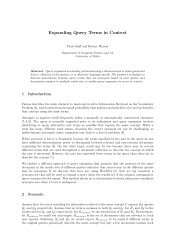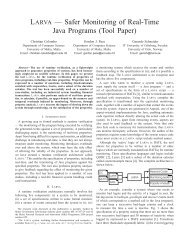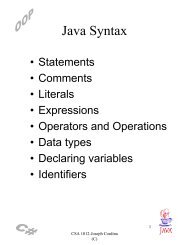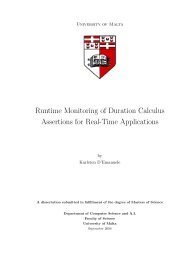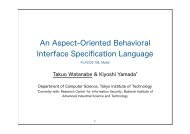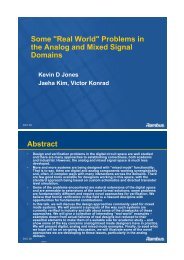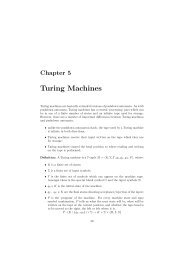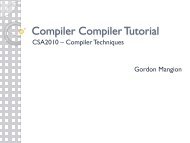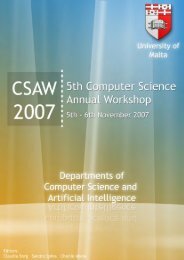Proceedings of CSAW'04 - FTP Directory Listing - University of Malta
Proceedings of CSAW'04 - FTP Directory Listing - University of Malta
Proceedings of CSAW'04 - FTP Directory Listing - University of Malta
You also want an ePaper? Increase the reach of your titles
YUMPU automatically turns print PDFs into web optimized ePapers that Google loves.
TTS Pre-processing Issues for Mixed Language Support 39<br />
limited (as is the case with most common computer keyboards in use 4 , for which specific shortcuts<br />
may be required) to non-existent (as in the case <strong>of</strong> mobile phones.) Given the use <strong>of</strong> English as<br />
a secondary language, this is generally not seen as a major usability issue, and the motivation to<br />
have such devices enabled is somewhat limited.<br />
While the advent <strong>of</strong> Unicode ([10]) is now helping to provide a reference format standard for<br />
Maltese text processing (although it still poses some computational issues, as it does not admit the<br />
representation <strong>of</strong> digraphs, such as ie and g¯h, as single character units), the situation regarding<br />
electronic texts at this point is really split in two. As regards <strong>of</strong>ficial documents or documents meant<br />
for public access, schemes have been utilised to represent the above characters using the ordinary<br />
ASCII encoding. The most typical is the use <strong>of</strong> particular fonts designed for Maltese typesetting<br />
(but incompatible with Unicode) whereby the glyphs <strong>of</strong> the above characters replace the entries<br />
for certain punctuation characters ([]). Under other schemes, such as that used in Maltilex ([11]),<br />
character escape sequences are used instead.<br />
On the other hand, where the presentation <strong>of</strong> text is not critical, it is <strong>of</strong>ten the case that letters<br />
containing diacritical marks are written instead with those ASCII character counterparts that do<br />
not, which, corresponding to the above, would be c, C, h, H, gh, Gh, z and Z. Despite what would<br />
constitute intrinsic spelling mistakes, a native speaker can immediately identify and interpret the<br />
underlying message 5 . However, such text cannot be directly operated upon prior to resolving the<br />
resulting lexical ambiguities.<br />
Resolving this issue is an exercise in spell checking, albeit a simplified one. One could envisage<br />
resolving it using a threefold approach (starting from the assumption that the word has already<br />
been tagged as a Maltese one.) First, certain re-write rules can be applied. For instance, c can<br />
be safely re-written as ċ in all cases, since the previous character does not exist in the Maltese<br />
alphabet. Secondly, use <strong>of</strong> a dictionary can sort out some entries, as it will list żarbun but not<br />
zarbun. Finally, one could consider using stochastically based re-write rules trained on a corpus<br />
written in two fashions, once in the appropriate encoding and one using the ASCII character set<br />
only.<br />
3 Language Classification Implementation<br />
In the following, the process <strong>of</strong> developing a language classification mechanism for differentiating<br />
between Maltese and English words, based upon the ideas from the previous section, is described.<br />
Such a mechanism would form part <strong>of</strong> a more complete pre-processor module.<br />
3.1 Corpora and Bigram Calculation<br />
In order to estimate the n-gram probabilities, suitable corpora for the languages under consideration<br />
is required. In order for the probabilities to be meaningful, the corpora are required to be<br />
substantially large, and ideally from the same domain as the text that needs to be classified.<br />
Unfortunately, corpora consisting solely <strong>of</strong> SMS messages already organised as Maltese or English<br />
are not readily available, and deriving substantially sized ones would be a very time consuming<br />
exercise. An alternative textual corpus is available in the form <strong>of</strong> the Laws <strong>of</strong> <strong>Malta</strong> ([12]). These<br />
provide a suitably large and balanced corpora for both Maltese and English. (The fact that the<br />
4 A Maltese keyboard standard has been defined but is not in widespread use.<br />
5 Essentially, this is a more natural occurrence <strong>of</strong> the phenomenon illustrated in Fig. 1.



